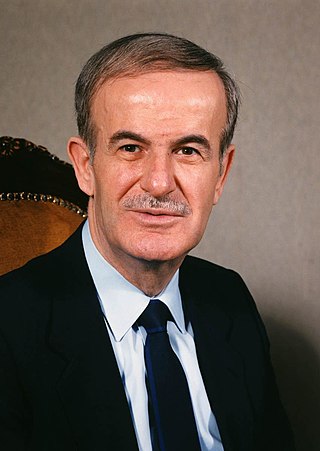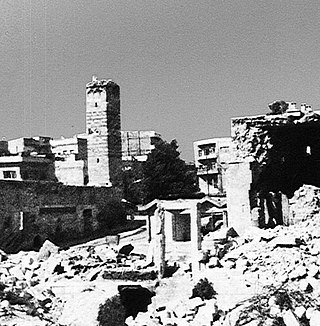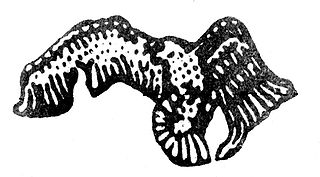
Saddam Hussein was an Iraqi politician and revolutionary who served as the fifth president of Iraq from 1979 to 2003. He also served as prime minister of Iraq from 1979 to 1991 and later from 1994 to 2003. He was a leading member of the revolutionary Arab Socialist Ba'ath Party and later its Iraqi regional branch. Ideologically, he espoused Ba'athism, a mix of Arab nationalism and Arab socialism, while the policies and political ideas he championed are collectively known as Saddamism.

Hafez al-Assad was a Syrian politician and armed forces officer who served as the 18th president of Syria from 1971 until his death in 2000. He had previously served as prime minister of Syria from 1970 to 1971 as well as regional secretary of the regional command of the Syrian regional branch of the Arab Socialist Ba'ath Party and secretary general of the National Command of the Ba'ath Party from 1970 to 2000. Hafez al-Assad was a key participant in the 1963 Syrian coup d'état, which brought the Syrian regional branch of the Arab Socialist Ba'ath Party to power in the country.

Izzat Ibrahim al-Douri was an Iraqi politician and army field marshal. He served as Vice Chairman of the Iraqi Revolutionary Command Council until the 2003 U.S. invasion of Iraq and was regarded as the closest advisor and deputy under President Saddam Hussein. He led the Iraqi resistance group Naqshbandi Army.

The Hama massacre occurred in February 1982 when the Syrian Arab Army and the Defense Companies paramilitary force, under orders of president Hafez al-Assad, besieged the town of Hama for 27 days in order to quell an uprising by the Muslim Brotherhood against the Ba'athist government. The campaign that had begun in 1976 by Sunni Muslim groups, including the Muslim Brotherhood, was brutally crushed in an anti-Sunni massacre at Hama, carried out by the Syrian Arab Army and Alawite militias under commanding General Rifaat al-Assad.

Al-Awda is an Arab socialist political party in Iraq. Al-Awda's name began appearing in Iraq in June 2003 in anti-occupation graffiti and leaflets in Baghdad and to the north and west of the capital. The group is led by Mohammed Younis al-Ahmed, who is based in Syria.

Amin al-Hafiz, also known as Amin Hafez, was a Syrian general, politician, and member of the Ba'ath Party who served as the President of Syria from 27 July 1963 to 23 February 1966.

Mohammed Younis al-Ahmed al-Muwali, also known by his pseudonym Khadr al-Sabahi, is an Iraqi former military officer and former senior member of the Iraqi Ba'ath Party. Ahmed currently has a million dollar bounty placed on his head as one of Iraq's most wanted men accused of funding and leading resistance operations. He is the leader of al-Awda; an underground Ba'athist movement in Iraq.

Iraq–Syria relations are the bilateral/diplomatic relations between the sovereign states of Iraq and Syria. Both countries/nations are neighbours and they share the Iraq–Syria border. Relations are marked by long-shared cultural and political links, as well as former regional rivalry. The two countries took their present form after the Sykes–Picot Agreement to dismember the Ottoman Empire into British and French spheres of influence after World War I.

Ba'athist Iraq, officially the Iraqi Republic (1968–1992) and later the Republic of Iraq (1992–2003), was the Iraqi one party state between 1968 and 2003 under the rule of the Arab Socialist Ba'ath Party. This period began with high economic growth, but ended with the country facing severe levels of socio-political isolation and economic stagnation. By the late 1990s, the average annual income had decreased drastically due to a combination of external and internal factors. UNSC sanctions against Iraq, in particular, were widely criticized for negatively impacting the country's quality of life, prompting the establishment of the Oil-for-Food Programme. The Ba'athist period formally came to an end with the 2003 invasion of Iraq, and the Ba'ath Party has since been indefinitely banned across the country.

The Corrective Movement, also referred to as the Corrective Revolution or the 1970 coup, was a bloodless coup d'état led by General Hafez al-Assad on 13 November 1970 in Syria. Assad proclaimed to sustain and improve the "nationalist socialist line" of the state and the Ba'ath party. Ba'ath party adopted an ideological revision, absolving itself of Salah Jadid's doctrine of exporting revolutions. The new doctrine placed emphasis on defeating Israel, by developing the Syrian military with the support of the Soviet Union. Assad would rule Syria until his death in 2000, after which he was succeeded by his son Bashar al-Assad.

The Islamist uprising in Syria comprised a series of protests, assassinations, bombings, and armed revolts led by Sunni Islamists, mainly members of the Fighting Vanguard and, after 1979, the Muslim Brotherhood, from 1976 until 1982. The uprising aimed to establish an Islamic republic in Syria by overthrowing the Ba'athist government, in what has been described by Ba'ath Party as a "long campaign of terror".

The Arab Socialist Ba'ath Party, also referred to as the pro-Iraqi Ba'ath movement, is a Ba'athist political party which was headquartered in Baghdad, Iraq, until 2003. It is one of two parties which emerged from the 1966 split of the original Ba'ath Party.

The Arab Socialist Ba'ath Party, also referred to as the pro-Syrian Ba'ath movement, is a neo-Ba'athist political party with branches across the Arab world. The party emerged from a split in the Ba'ath Party in February 1966 and leads the government in Syria. From 1970 until 2000, the party was led by the Syrian president and Secretary General Hafez al-Assad. Until October 2018, leadership has been shared between his son Bashar al-Assad and Abdullah al-Ahmar. In 2017, after the reunification of the National and Regional Command, Bashar al-Assad became the Secretary General of the Central Command. The Syrian branch of the Party is the largest organisation within the Syrian-led Ba'ath Party.

The Arab Socialist Ba'ath Party – Iraq Region, officially the Iraqi Regional Branch, is an Iraqi Ba'athist political party founded in 1951 by Fuad al-Rikabi. It was the Iraqi regional branch of the original Ba'ath Party, before changing its allegiance to the Iraqi-dominated Ba'ath movement following the 1966 split within the original party. The party was officially banned following the American invasion of Iraq in 2003, but despite this it still continues to function underground.

Saddamism, also known as Saddamist Ba'athism, is a Ba'athist political ideology based on the political ideas and thinking of Saddam Hussein, who served as the President of Iraq from 1979 to 2003. It espouses Arab nationalism, Arab socialism and Pan-Arabism, as well as an Iraq-centred Arab world that calls upon Arab countries to adopt Saddamist political discourse and reject "the Nasserist discourse" that it claims collapsed following the Six-Day War in 1967. It is militarist and views political disputes and conflict in a military manner as "battles" requiring "fighting", "mobilization", "battlefields", "bastions", and "trenches". Saddamism was officially supported by Saddam Hussein's government and promoted by the Iraqi daily newspaper Babil owned by Saddam's son Uday Hussein.

The Tunisian Ba'ath Movement is a political party in Tunisia. It is the Tunisian regional branch of the Iraqi-led Ba'ath Party.

The Arab Socialist Ba'ath Party – Syria Region, officially the Syrian Regional Branch, is a neo-Ba'athist organisation founded on 7 April 1947 by Michel Aflaq, Salah al-Din al-Bitar and followers of Zaki al-Arsuzi. The party has ruled Syria continuously since the 1963 Syrian coup d'état which brought the Ba'athists to power. It was first the regional branch of the original Ba'ath Party (1947–1966) before it changed its allegiance to the Syrian-dominated Ba'ath movement (1966–present) following the 1966 split within the original Ba'ath Party. Since their ascent to power in 1963, neo-Ba'athist officers proceeded by stamping out the traditional civilian elites to construct a military dictatorship operating in totalitarian lines; wherein all state agencies, party organisations, public institutions, civil entities, media and health infrastructure are tightly dominated by the army establishment and the Mukhabarat.

Ba'athism, also spelled Baathism, is an Arab nationalist ideology which promotes the creation and development of a unified Arab state through the leadership of a vanguard party over a socialist revolutionary government. The ideology is officially based on the theories of the Syrian intellectuals Michel Aflaq, Zaki al-Arsuzi, and Salah al-Din al-Bitar. Ba'athist leaders of the modern era include the former president of Iraq Saddam Hussein, former president of Syria Hafez al-Assad, and his son, the current president of Syria, Bashar al-Assad.

This article details the history of the Syrian Regional Branch of the Ba'ath Party.
The 1979–1980 Shia uprising in Iraq, also known as the First Sadr Uprising, took place as a followup to the Iranian Revolution (1978–1979) in neighbouring Iran, as the Shia Iraqi clerics vowed to overthrow Ba'athist Iraq, dominated by (secular) Sunni Muslims - specifically the Saddam Hussein family. Saddam and his deputies believed that the riots had been inspired by the Iranian Revolution and instigated by Iran's government. The riots erupted in May 1979 and escalated in June - leading to thousands being tortured and killed in Najaf. The uprising subsided with the April 1980 arrest of the leader of Shia Iraqis, Muhammad Baqir al-Sadr and his subsequent execution.
















